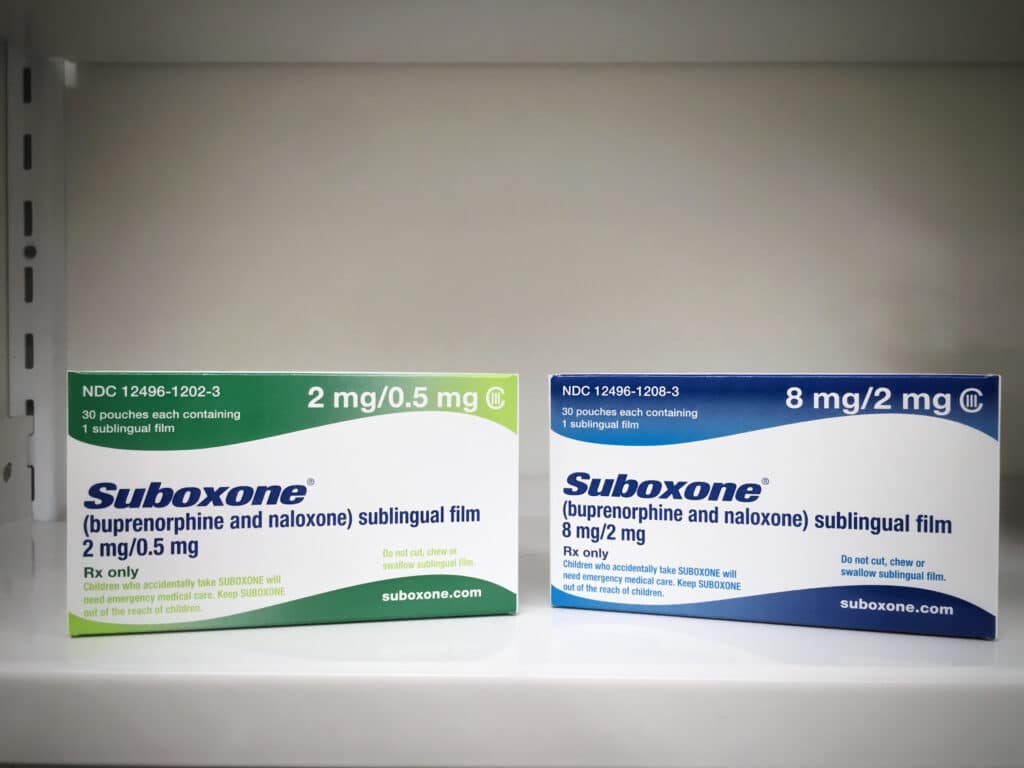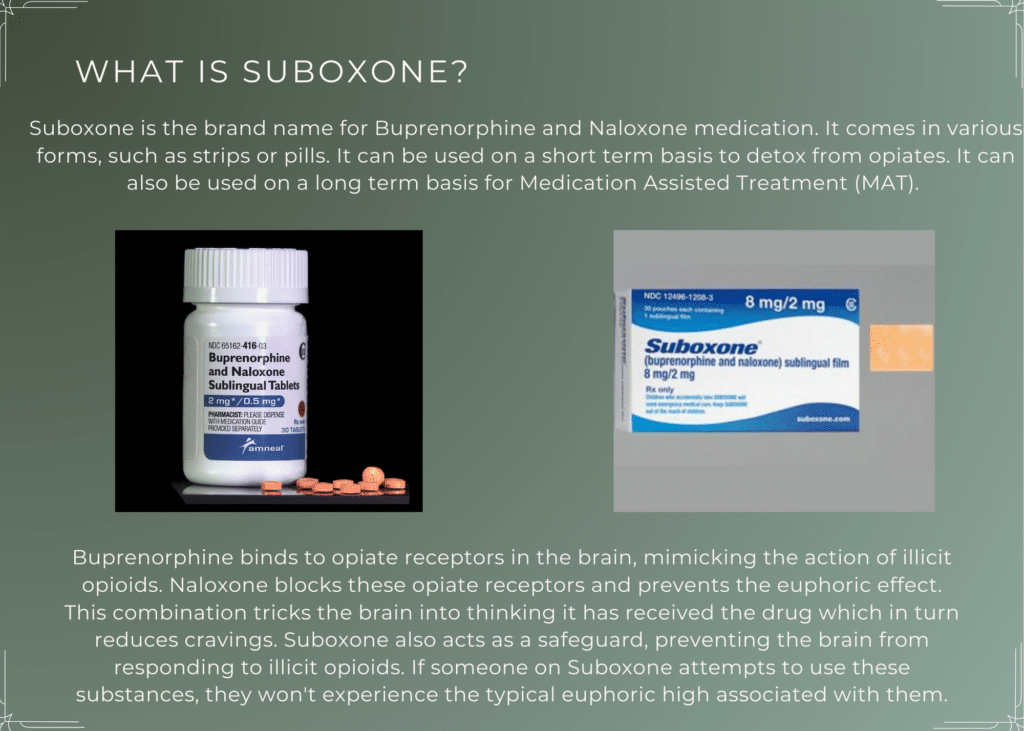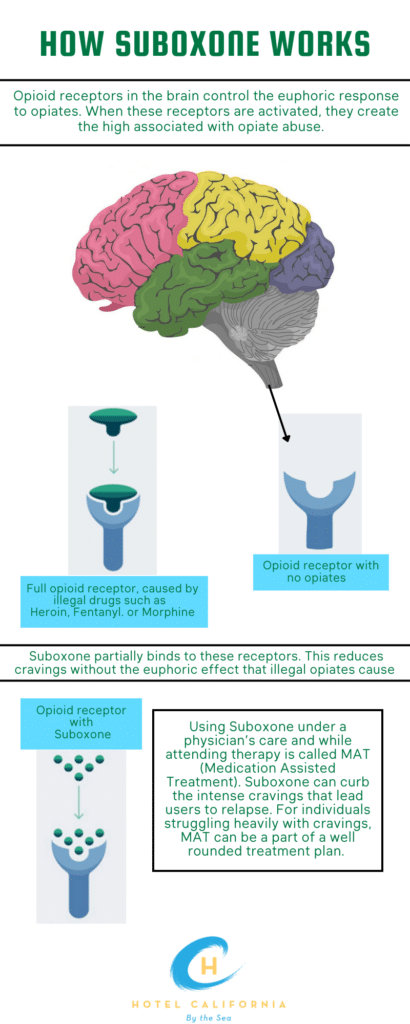Can you get high on Suboxone?
Suboxone is one of the most commonly prescribed medications used to treat those with opioid use disorder. Suboxone is often used in medication assistance treatment (MAT) during the detox stage of recovery. First approved in 2002 by the FDA to treat opioid use disorder, the Schedule III controlled substance is considered to be the standard of care when it comes to medication treatments for chronic addiction to opioids. It has a low potential for abuse or addiction but can only be prescribed by specialized physicians.

Physicians and addiction experts alike agree that suboxone is highly effective in saving lives. When taken as intended, the medication can help reduce the severity of intense withdrawal symptoms such as drug cravings and other psychological symptoms. Suboxone is available in a tablet or film that can be placed under the tongue or between the gums and cheek where it will dissolve quickly into the body. It is usually taken to help with withdrawal management of opioids but can be continued throughout the duration of rehab treatment.
Suboxone addiction is considered a rare occasion due to its low potential for abuse. However, is it still possible to develop dependence on the drug? Is it possible to get high on suboxone?
How does it work?
Suboxone consists of two active ingredients: buprenorphine and naloxone. Buprenorphine is a partial opioid agonist. It works by preventing other opioids from binding with the opioid receptors in the central nervous system. It utilizes a slow tapering method off opioids as well as helping to lessen the severity of opioid withdrawal symptoms such as intense drug cravings.
Naloxone is an opioid antagonist. It works by blocking and reversing the effects of opioids on the nervous system. It is often used as an injection to prevent opioid overdose. Naloxone essentially prevents the misuse of opioids because it blocks out its effects entirely. Together, the drug blunts the sensations of intoxication and can prevent drug cravings.
One treatment of suboxone can last anywhere between 24 -72 hours. The medication starts working within 20 – 45 minutes after initial intake and can provide patients with withdrawal symptom relief throughout the day and for the duration of their recovery treatment.

Can you get high on Suboxone?
When taken as directed by a medical professional, it is unlikely that suboxone will cause any sort of high. Suboxone is still considered an opioid. And it still has the ability to alter brain chemistry, which technically can cause a slight sense of euphoria or addiction. However, it causes a much weaker effect compared to other opioids such as heroin or oxycodone and does not cause a high in those who experience opioid use disorder. It is extremely difficult to become addicted or get a “high” from using suboxone.
For those who have used opioids in the past or are taking suboxone for the treatment of opioid use disorder, it is highly unlikely that they will be able to experience any sort of “high” from using suboxone. Suboxone is only a partial opioid agonist, it is very slow acting and it contains the two active ingredients that prevent the effects of opioids in the brain.
The naloxone active will automatically block any of the opioid receptors resulting in zero opioid effects. The buprenorphine active can only partially activate any opioid receptors, but ultimately has a limited ability to cause any sort of “high.” Ultimately, suboxone does not stimulate feelings of euphoria. It does not produce those types of feel-good effects, but under specific circumstances, there is a potential for it to become addictive.

Addiction to suboxone is most likely to occur in people who have never used opioids before. If a person has no history of opioid use disorder or taking opioids, misuse of suboxone can cause a sense of high and euphoria. When there is no history of opioid use, the brain and body are not accustomed to having opioids in the system. This can result in the body’s overreaction to suboxone causing a sensation of euphoria and high.
Suboxone is also only likely to cause a high when it is mixed with other mind-altering substances. A study from July 2019 to July 2021 found that an estimated 2.6% of all opioid-related overdose deaths also involved buprenorphine. The combination of benzos, alcohol or other stimulants with suboxone can cause a person to get high. These polydrug combinations are more likely to cause a high compared to suboxone use alone.
So can suboxone get you high? When used for the treatment of opioid use disorder and addiction, suboxone does not have the ability to make a person feel high. If a person who has no history of opioid use decides to abuse suboxone, there is a higher chance of experiencing a sense of euphoria and developing an addiction.
Check Your Insurance Coverage for FREE
Find out if your insurance covers addiction treatment in minutes. We accept most insurance!
Effects of Suboxone Use
Some of the most common side effects of suboxone include:
- Anxiety
- Depression
- Fatigue
- Fever
- Headache
- Insomnia
- Muscle pain
- Nausea
- Sweating
- Paranoia
- Changes in appetite
- Abdominal cramping and digestive issues
- Mood swings
- Drug cravings and misuse
- Hormonal issues – Adrenal insufficiency
- Liver damage
- Withdrawal
In extreme cases in which a person has developed an addiction to suboxone, symptoms of withdrawal can occur. It can occur as soon as the first three days after suboxone use has stopped. Withdrawal can be categorized into two main phases: short-term acute withdrawal and long-term withdrawal. Short-term acute withdrawal is also known as opioid abstinence syndrome. The length of this phase depends on each person and varying factors. It can last anywhere from 5 hours and up to 5 days.
Long-term withdrawal is also known as protracted opioid withdrawal syndrome. During this phase, withdrawal effects are often associated with psychological distress and trauma. This is why a combination of medication along therapeutic treatments is an important aspect of addiction recovery. This helps treat the co-occurring mental health conditions that often arise due to addiction withdrawal.
On rare occasions, suboxone can also cause overdose in those who continue to abuse the medication. Overdose signs consist of constricted pupils, mental confusion, impaired vision, slurred speech, poor motor coordination, nausea and vomiting, difficulty breathing, impaired memory and seizures.
Reasons for using Suboxone
According to the American Society of Addiction Medicine, suboxone is the most recommended treatment for opioid use disorder treatment. It can be used for short-term treatment during the initial detox phase or as a long-term medication treatment throughout the duration of substance abuse rehab. This is also known as the induction and maintenance periods of opioid use disorder treatment.
During the induction phase, the drug is used to help initially detox the body from all substances to begin the healing process. During the maintenance phase, suboxone can be used as a stable dosage over a set extended period of time to maintain withdrawal symptoms and keep cravings in check throughout recovery.
It is often prescribed to manage and reduce the intensity of opioid withdrawal symptoms. According to recent studies, 75% of people who reported misusing suboxone, did so in an attempt to try and manage their own opioid withdrawal symptoms. Without the guidance and supervision of an experienced medical physician or addiction medical professional, incorrect dosages of suboxone can be taken causing users to experience a high and develop an addiction.
Reach out to Hotel California by the Sea
We specialize in treating addiction and other co-occurring disorders, such as PTSD. Our Admissions specialists are available to walk you through the best options for treating your addiction.
Treatment for Suboxone Addiction
Treatment for a substance addiction requires professional resources and expertise. One type of treatment that is being more commonly utilized is called Accelerated Neuro-Regulation (ANR). It is an opioid dependence treatment that helps to return the brain back to its pre-addiction state. It works by regulating the endorphin-receptor system in the body and can help detox the body from suboxone without having the endure withdrawal symptoms. This type of treatment allows patients to recover within days compared to traditional MAT programs that often last for months.
Like any other mind-altering substance suboxone is an opioid that has the potential to cause addiction and should be treated through a behavioral health treatment program. Hotel California by the Sea provides an effective treatment plan for people who are experiencing an addiction to suboxone or traditional opioids such as heroin, fentanyl and oxycodone.
The behavioral health care program provides treatment at all levels of care including detox, residential programs, IOP and PHP programs. In addition to offering different treatment levels, unique and specialized treatments are also utilized. CBT, DBT and EMDR therapy offer clients a deeper insight into the psychological aspect of their addiction. The combination of medication treatments and rigorous therapies provides a well-rounded approach to addiction treatment touching on every aspect of substance use disorder. Hotel California by the Sea offers clients a unique experience when it comes to treating and overcoming their addiction and co-occurring mental health conditions.
References:
https://www.addictioncenter.com/opiates/suboxone-addiction-abuse/
https://www.medicalnewstoday.com/articles/325827
https://www.confidanthealth.com/buprenorphine-suboxone-and-subutex/suboxone-high
https://www.bicyclehealth.com/suboxone-faq/does-suboxone-get-you-high
https://thenextep.org/does-suboxone-get-you-high/
https://anrclinic.com/blog/suboxone-overdose/
